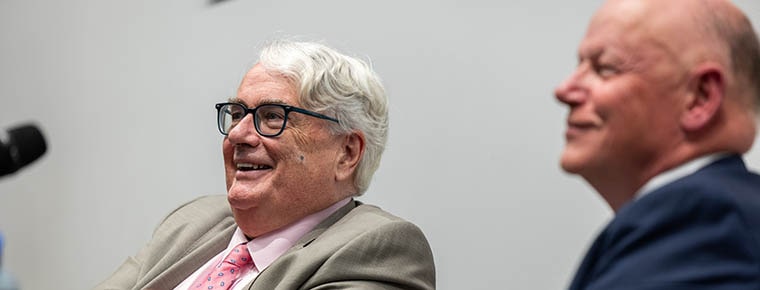
Maths brain enables logical judgment writing – Clarke
Receiving the Hibernian Law Medal at the Law Society in Blackhall Place (5 June), former Chief Justice Frank Clarke reflected on the 2024 centenary of independent Irish courts.
He said that the High Court had continued largely as it was under British rule, but that the establishment of the District Court had been a radical change with an expanded jurisdiction.
The conferral ceremony was chaired by Chief Justice Donal O’Donnell.
Mr Justice Clarke said that when he was called to the Bar in July 1973, there were just 12 judges in the superior courts – four ordinary judges of the Supreme Court, plus the chief justice, and six ordinary High Court judges and the president.
Massive change
This situation had seen a massive change in 50 years to a judicial cohort that now exceeded 80 – a sevenfold multiplication.
The judge’s job was also a lot more difficult now, Clarke said – the population had increased significantly to over five million, while types of work before the courts had also expanded hugely in range.
“We now live in a more complex society, and we have much more complex laws than we had in 1973,” he stated.
Ireland joined the EEC just before Clarke was called to the Bar in 1973.
Now almost every area of legal life was affected to some extent by the laws of the European Union, and a working knowledge of EU law was essential, he said.
The change in the male-female balance of the profession was highly visible, he said, given that there were just eight women barristers when he joined the Law Library in 1973.
Economic diversity
However, other areas of diversity, such as the economic background of those entering the profession, also mattered, he added.
Mr Justice Clarke also told the event that the racial diversity now present in Ireland was not yet reflected in the legal profession, as this would take time to filter through.
“You can't compare today's balance of ethnic diversity of the population with the judiciary of today, because they're not comparing like with like. Today's judiciary are people who would have qualified as lawyers probably somewhere between 1975 and 2000.
“It is the nature of our system that people are appointed in the latter stages of a legal career,” he said.
“It's not, in my view, correct to try and compare today's judiciary with today's balance of population,” he said.
Clarke added that he had benefitted from free education, and his fees at the King’s Inns were paid by a scholarship from the Department of Education.
Upper reaches of profession
Better access now to third-level education should see more people from less advantaged backgrounds – including among the new Irish – get to the upper reaches of the legal profession, he said.
“In truth, there hasn't been new Irish around in numbers long enough to be able to test that,” he said, “but it is something that I think needs to be tested in the future.”
The former chief justice said that he had happy memories of his ongoing legal career and hoped that he had been able to make some contribution to the development of the law in Ireland.
“Insofar as being awarded this Hibernian Law Medal is a recognition of the things that I have done, I am really proud and very happy to have the honour,” he said.
In a subsequent conversation with Chief Justice Donal O’Donnell, Frank Clarke said that his undergraduate degree in maths had helped him with structuring his judgments logically.
“I think there's a way of thinking which becomes ingrained in you when you study mathematics, which I'm sure unconsciously affected the way I approached legal problems, of building proof on proof,” he explained.
The Irish Supreme Court had a reasonable balance between pure law backgrounds and more varied disciplines, the former chief justice added.
His legal career had allowed an enjoyable level of reinvention, he said, since the job of a junior barrister was very different to that of a senior counsel (SC), and different again to that of being on the bench.
Clarke said that he became far more diligent at paperwork once he went on the bench, because it was imperative to deliver judgments to a deadline.
Distinctive judge styles
The gathering heard that judges often had distinctive styles, and their segments could be detected in jointly written judgments.
Clarke took a mathematical-proof approach, with a distinctive internal numbering system.
“The total amount of work that is involved in producing judgments is significantly reduced if you do them very soon after the case,” he said, advising against waiting three months.
One of Frank Clarke’s tasks is to serve on the 255 committee, which has the goal of improving the quality of judges nominated to the CJEU and is named after Article 255 of the Lisbon Treaty.
It provides that it should be representative of not only the geographical balance of the union, but also the legal culture, so Ireland’s role had been enhanced with Brexit, he explained.
Internal logic
The former chief justice told the event that differing legal systems tended to have an internal logic, and superficial ideas about the continental system might reveal more subtlety on closer examination.
Judges must increasingly engage with the ways of other legal systems, for example in European arrest-warrant cases, he added.
Mr Justice Clarke said that he had tried, as a judge, to bring the courts out to the public.
“You can't complain if you don't explain,” he added, and while some criticisms of the system were valid, others were not justified.
“Sometimes it's our fault because we don't explain why things work the way they do,” he said.
That work of explanation would mitigate against the phenomenon of lack of public respect for institutions, he concluded.
- For more photos of the event, go to https://www.lawsociety.ie/gazette/gallery-video